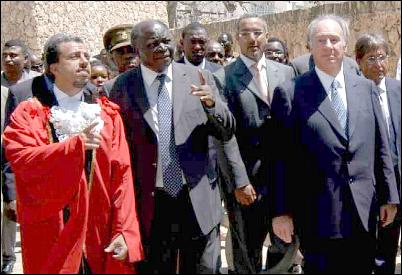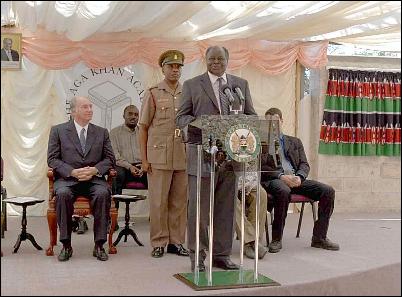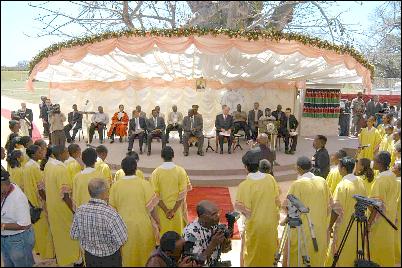.
.
.
AGA
KHAN AND
PRESIDENT KIBAKI
INAUGURATE AGA KHAN ACADEMY
.

Coastweek
- - Mombasa
Mayor, His Worship Councillor
Taib Ali Taib (left) seen with His Excellency President
Mwai Kibaki, Gender and Sports Minister Hon. Najib Balala,
and His Highness the Aga Khan, during inauguration
of the
Mombasa Aga Khan Academy.
OF 'ACADEMIC CENTRES OF EXCELLENCE'
Coastweek
- - Aga Khan
Academy, Mombasa, has been officially inaugurated by President Mwai
Kibaki in the presence of His Highness the Aga Khan, Imam (spiritual
leader) of the Ismaili Muslims.
The Aga Khan
Academy, Mombasa, is the first in an international network of close to
20 'academic centres of excellence'.
"A new
school," said the Aga Khan, "looks to a better world, for it
exists to help students develop the character, intellect and mental
resilience that will enable them to prosper in circumstances that we
can only imagine."
A great
school, the Aga Khan said, "will educate its students not merely
to be personally successful but also to use their gifts to build their
communities and enhance the common good to levels beyond our
dreams."
The Aga Khan
was speaking to a distinguished audience of government and civic
dignitaries and educators that included ministers concerned with
education from eight countries across Africa, Central Asia and the
Middle East, as well as experts from Europe and North America.
He explained
that one of the reasons of the schools was to offer improved
opportunities to the many students from the developing world who
"will never have the possibility of proceeding to higher
education."
Another
reason was that despite "a world more deeply divided, farther
from the great ideals of tolerance and respect among nations, faiths
and peoples.. than at any
time since the end of the Colonial Era," there was hope for
bridging this divide.
"The
effective world of the future is one of pluralism," said the Aga
Than, ''but such a world must be educated to see in pluralism,
opportunities for growth in all areas of human endeavour."
Echoing these
sentiments, President Kibaki said that "nationalities do not
matter" when it comes to the value of the new ideas that the Aga
Khan was seeking to plant and allow to grow in Kenya as elsewhere in
the world.
Calling it
"an anachronistic absurdity" that students from Africa and
Asia often had to go abroad to study their cultures," the Aga
Khan stressed that knowledge and talent from these continents must
"contribute to the global edifice of knowledge."
.

Coastweek
- - His Excellency
President Mwai Kibaki seen
while addressing His Highness the Aga Khan, and other
invited guests during inauguration of the Mombasa Aga
Khan Academy.
Describing
one of the outstanding characteristics of the academic centres of
excellence, the Aga Khan explained that "graduates, through their
periods of study on other campuses, will have personally experienced
different social, ethnic and religious environments."
He reiterated
that students in the school will gain basic education in the fields of
study most needed for development of their societies and home
countries, but would also have a strong grounding in the
humanities".
The Aga Khan
Academies will feature a curriculum based on the International
Baccalaureate (IB) and a system of international student and teacher
exchanges between Academies in different countries as well as with
allied schools, including Phillips Academy in the United States and
the Schule Schloss Salem in Germany.
Proficiency
in at least two languages, of which one will be English, and
progressive mastery of information tech-nologies will also be
hallmarks of the programmes.
To ensure
access regardless of socio-economic status or other limiting factors,
admission to the Academies will be merit-based and means-blind.
According to
the Aga Khan, three characteristics of the Academies would be indispen-sable.
One was the
quality of teachers, of students and of physical facilities.
"A major
goal of these academic centres of excellence," be said. "is
to rejuvenate and restore the public standing of the profession of
teaching."
"The
intellectual quality of the school depends not upon an abstract
curricular design, but upon the quality of mind, classroom
inventiveness and dedication of the teacher and upon the support given
that teacher by parents and school leaders."
Speaking of
teachers, the Aga Khan said "we must not only compensate them
appropriately and in accord with our expectations that they will grow
professionally, but assure to them a quality of life which will both
satisfy them, and encourage future generations of educated men and
women to see in teaching a great and valid opportunity in life, and
not a profession of last resort."
.

Coastweek
- - STUDENT
CHOIR entertains His Excellency
President Mwai Kibaki, His Highness the Aga Khan, and
other invited guests during inauguration
of the Mombasa
Aga Khan Academy.
The second
characteristic was that these centres would be important because of
their "connectedness" to other intellectual resources such
as the Aga Khan University's Institute of Educational Development (IED)
and schools such as Philips Academy in the United States and Schule
Schloss Salem in Germany.
The third
quality that these schools would need to guard, he said, was their
integrity.
"Education,"
the Aga Khan emphasised, "was an intensely moral enterprise,
which depends upon clear ethical rules.
"If
children and their families can be confident that admission to the
Academies is by open, understood criteria, that examinations are
administered with integrity and that honours are awarded only for
intellectual merit, the Academies will attract the most able and
honourable applicants."
"It is
my hope," he concluded, "that it will be members of this new
generation who, driven by their own wide knowledge and inspiration,
will change their societies; that they will gradually replace many of
the external forces that appear, and sometimes seek, to control their
destinies."
Each Academy
will incorporate a Professional Development Centre for teacher
training and curricular innovation at all affiliated institutions.
Each Centre
will function not only for the benefit of the Academy but extend
modern teaching and learning methods to government and private schools
locally and regionally.